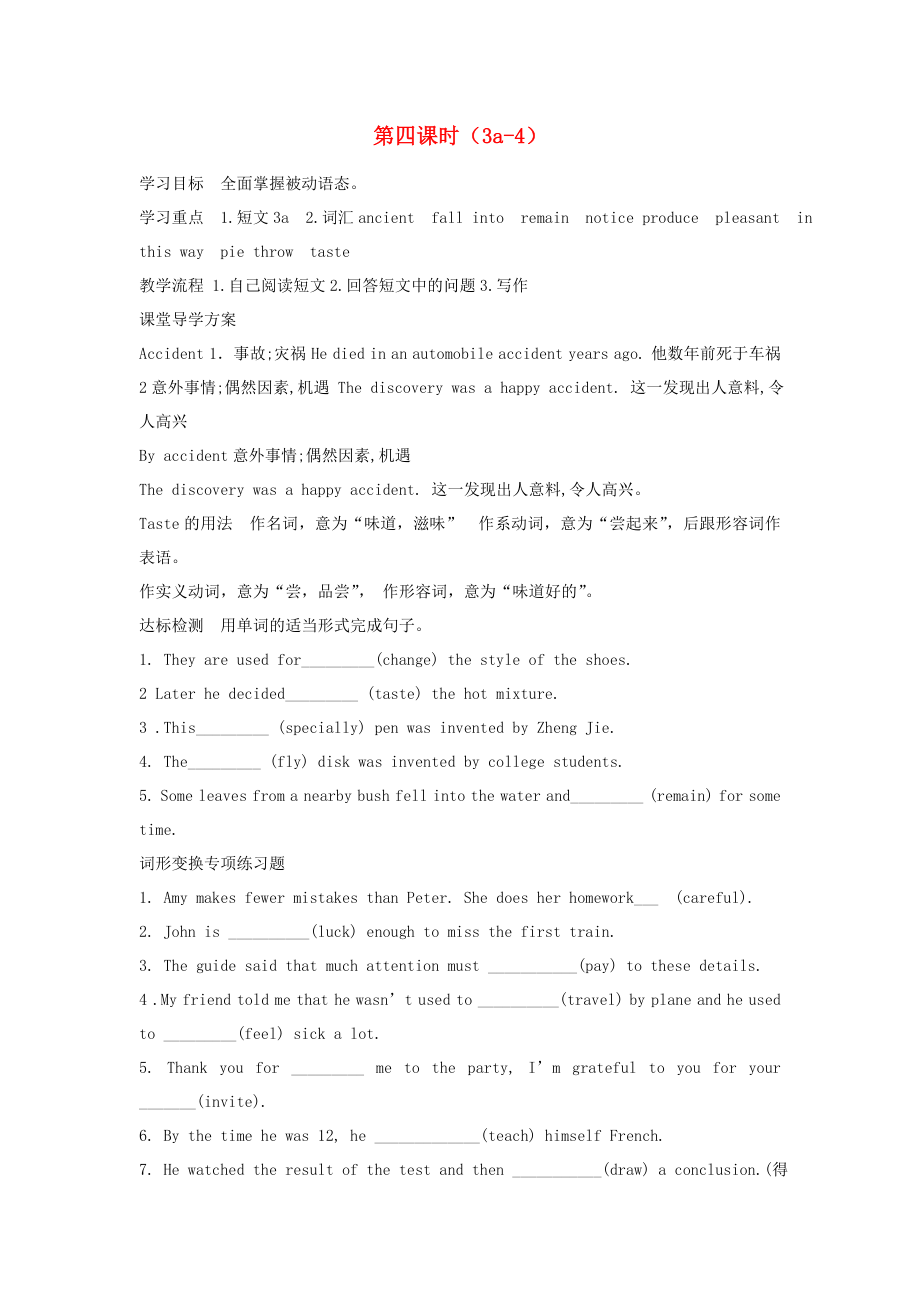《黑龍江省黑河市愛(ài)輝鎮(zhèn)中學(xué)九年級(jí)英語(yǔ)全冊(cè) Unit 9 When was it invented 4導(dǎo)學(xué)案(無(wú)答案) 人教新目標(biāo)版》由會(huì)員分享��,可在線閱讀�����,更多相關(guān)《黑龍江省黑河市愛(ài)輝鎮(zhèn)中學(xué)九年級(jí)英語(yǔ)全冊(cè) Unit 9 When was it invented 4導(dǎo)學(xué)案(無(wú)答案) 人教新目標(biāo)版(3頁(yè)珍藏版)》請(qǐng)?jiān)谘b配圖網(wǎng)上搜索���。
1、第四課時(shí)(3a-4)
學(xué)習(xí)目標(biāo) 全面掌握被動(dòng)語(yǔ)態(tài)����。
學(xué)習(xí)重點(diǎn) 1.短文3a 2.詞匯ancient fall into remain notice produce pleasant in this way pie throw taste
教學(xué)流程 1.自己閱讀短文2.回答短文中的問(wèn)題3.寫作
課堂導(dǎo)學(xué)方案
Accident 1.事故;災(zāi)禍 He died in an automobile accident years ago. 他數(shù)年前死于車禍
2意外事情;偶然因素,機(jī)遇 The discovery was a happy accident. 這一發(fā)現(xiàn)出人意
2、料,令人高興
By accident意外事情;偶然因素,機(jī)遇
The discovery was a happy accident. 這一發(fā)現(xiàn)出人意料,令人高興���。
Taste的用法 作名詞,意為“味道����,滋味” 作系動(dòng)詞,意為“嘗起來(lái)”��,后跟形容詞作表語(yǔ)�����。
作實(shí)義動(dòng)詞,意為“嘗��,品嘗”���, 作形容詞����,意為“味道好的”�。
達(dá)標(biāo)檢測(cè) 用單詞的適當(dāng)形式完成句子。
1. They are used for_________(change) the style of the shoes.
2 Later he decided_________ (taste) the hot mi
3���、xture.
3 .This_________ (specially) pen was invented by Zheng Jie.
4. The_________ (fly) disk was invented by college students.
5. Some leaves from a nearby bush fell into the water and_________ (remain) for some time.
詞形變換專項(xiàng)練習(xí)題
1. Amy makes fewer mistakes than Peter. She does her homework_
4��、__ (careful).
2. John is __________(luck) enough to miss the first train.
3. The guide said that much attention must ___________(pay) to these details.
4 .My friend told me that he wasn’t used to __________(travel) by plane and he used to _________(feel) sick a lot.
5. Thank you for _________ m
5���、e to the party, I’m grateful to you for your _______(invite).
6. By the time he was 12, he _____________(teach) himself French.
7. He watched the result of the test and then ___________(draw) a conclusion.(得出結(jié)論)
8. So far, we ___________(hold) twelve sports meetings.
9. This camera doesn’t belon
6、g to _________(he), it’s _________(I).
10. This car costs too much. Don’t you have something _________ (cheap)?
閱讀理解:When you are learning English, you find it not clever to translate an English sentence, word for word, into your own language. Take the sentence “How do you do?” for example. If you
7�����、 look up each word in the dictionary, one at a time, what is your translation? It must be a wrong sentence in your own language.
Languages don’t just have different sounds, they are different in many ways. It’s important to master the rules for word order in the study of English, too. If the speake
8、rs put words in a wrong order , the listener can’t understand the speaker’s sentence easily. Sometimes when the order of words in an English sentence is changed, the meaning of the sentence changes. But sometimes the order is changed, the meaning of the sentence doesn’t change between the two pairs
9����、of sentences:
“She only likes apples.” “Only she likes apples.”
“I have seen the film already.” “I have already seen the film.”
When you are learning English, you must do your best to get the spirit of the language and use it as the English speaker does.
( )1.From the passage we know that
10、 when we are learning English.
A. we shouldn’t put every word into our language
B. we should look up every word it the dictionary
C. we need to put every word into our own language
( )2.We can learn from the passage that .
A. if the order of words is different, the meaning of
11�����、 the sentence must be different
B. the order of words can never change the meaning of an English sentence
C. sometimes different order of words has a different meaning
( )3. “She only likes apples.” .
A. is the same as “Only she likes apples.”B. is different from “Only sh
12��、e likes apples.”
C. means “She likes fruit except apples.”
( )4. Which of the following is TRUE? A. The order of words can’t be changed
B. We should know the rules for word order when we study English
C. It’s important for us to translate an English sentence word for word
( )5.What’s the meaning of the underlined word “spirit”?A. 心情 B.本意 C.靈魂
 黑龍江省黑河市愛(ài)輝鎮(zhèn)中學(xué)九年級(jí)英語(yǔ)全冊(cè) Unit 9 When was it invented 4導(dǎo)學(xué)案(無(wú)答案) 人教新目標(biāo)版
黑龍江省黑河市愛(ài)輝鎮(zhèn)中學(xué)九年級(jí)英語(yǔ)全冊(cè) Unit 9 When was it invented 4導(dǎo)學(xué)案(無(wú)答案) 人教新目標(biāo)版

